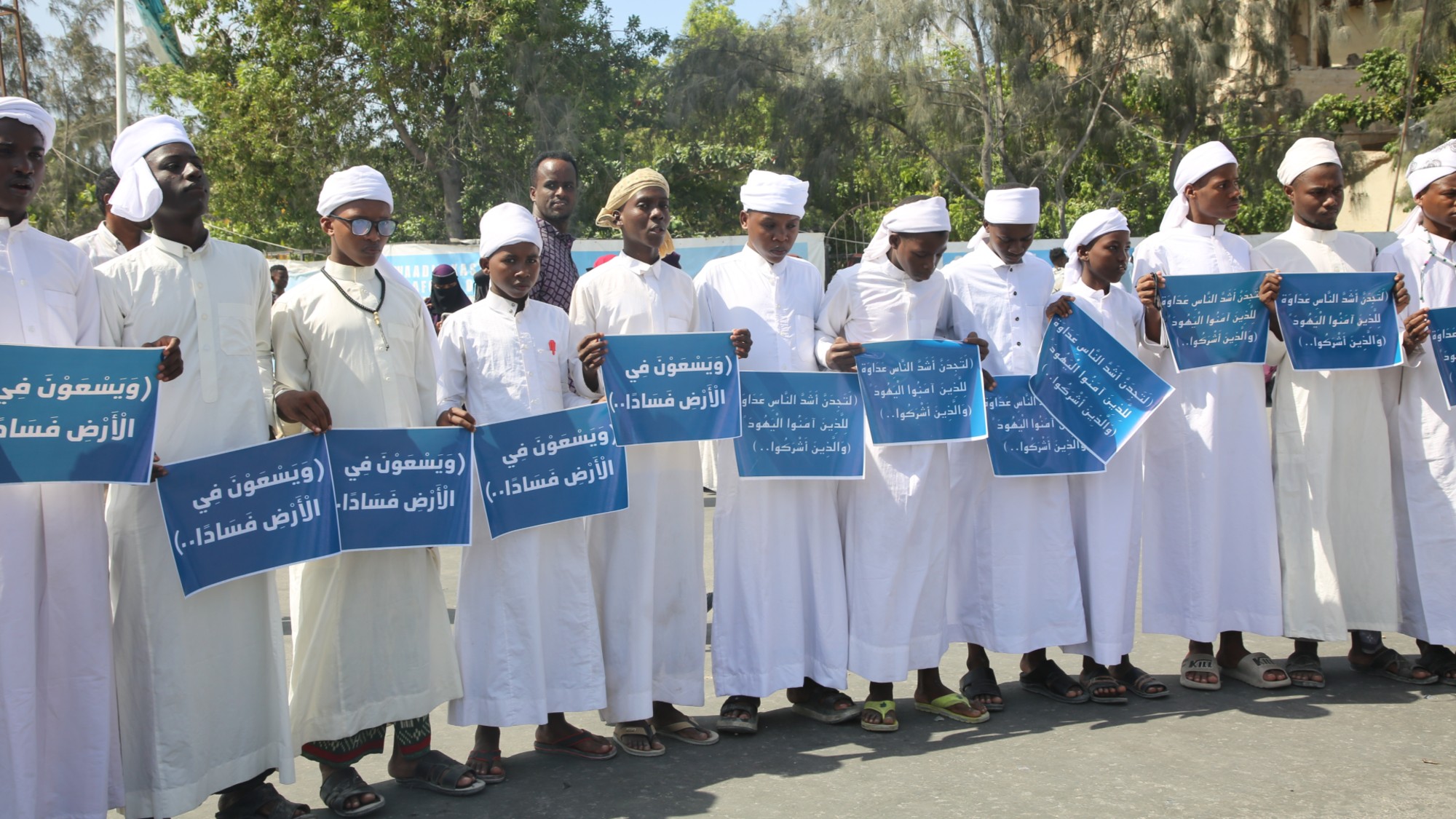The democratic crisis facing Israel and Benjamin Netanyahu
Condemnation grows at home and abroad over right-wing coalition’s radical reforms

A free daily email with the biggest news stories of the day – and the best features from TheWeek.com
You are now subscribed
Your newsletter sign-up was successful
News that Israeli military reservists have refused to report for duty in protest against the government’s plans to overhaul the judiciary has added to pressure on Prime Minister Benjamin Netanyahu and his far-right coalition.
Amid growing condemnation at home and abroad, it was reported that nearly all the reserve pilots in Israel’s elite long-range bomber squadron and other key members of the military have joined a growing strike against the government’s plans.
Netanyahu, who was reinstated as prime minister last December, “is quickly losing control of events”, said Amos Harel, senior fellow at the Brookings Institution think tank, and faces a stark choice whether to push on or pull back from the brink.
The Week
Escape your echo chamber. Get the facts behind the news, plus analysis from multiple perspectives.

Sign up for The Week's Free Newsletters
From our morning news briefing to a weekly Good News Newsletter, get the best of The Week delivered directly to your inbox.
From our morning news briefing to a weekly Good News Newsletter, get the best of The Week delivered directly to your inbox.
How did it come to this?
The elections last November, which ushered in what has widely been regarded as the most right-wing government in the country’s 75-year history, have “upended” Israeli politics, wrote human rights activist Dvir Aviam-Ezra for Politico.
For the first time ultra-religious, far-right and nationalist parties are part of the ruling coalition. Key government posts have been handed to extreme hardliners, such as national security minister Itamar Ben-Gvir, who is ideologically committed to the Israeli annexation of the West Bank.
The government has begun moves to expand Israeli settlements in the occupied territories, while proposing laws that would label NGOs and activists opposing the occupation as “foreign agents”, as is the case in Russia. Legislation is being proposed that would introduce political control over the police, impose the death penalty on terrorists who kill Israeli citizens while promising to prevent investigations of violent soldiers and, most contentiously, undermine judicial independence.
Al Jazeera said the laws and policies that are being introduced “are clearly aimed at undermining the separation of powers between the legislative, executive and judicial branches – a separation that serves to protect democracies from the tyranny of the majority”.
A free daily email with the biggest news stories of the day – and the best features from TheWeek.com
Many suspect that Netanyahu, who is currently facing bribery and fraud charges, has a personal motive for imposing changes to the judiciary. This would give the government total control over the appointment of judges and allow parliament to override Supreme Court rulings.
Legal experts have warned the so-called “override clause”, which would allow a majority of just one in Israel’s parliament, the Knesset, to overturn rulings by the Supreme Court, “could open the door to hitherto unimaginable possibilities in Israel’s democratic order”, said Haaretz. This includes theoretically the shutting down of any hostile newspaper, outlawing opposition parties or changing the election rules in a way that would clearly benefit the ruling coalition.
What has the reaction been?
With significant opposition to the measures driving mass protests, President Isaac Herzog warned last month that Israel risked being torn apart if the government and opposition fail to engage in dialogue to reach a compromise.
His comments were echoed by Hezbollah leader Hassan Nasrallah, who in a televised speech this week warned: “Everything that is happening in Israel is among the signs of the end of this entity”, The Times of Israel reported.
It comes “amid mounting disquiet among Jews in the UK and the US at the threats to Israeli democracy, violent attacks on Palestinians and a police crackdown on Israeli protesters”, said The Observer.
Speaking to the paper, historian Simon Schama called on British Jews to speak out over the “complete disintegration of the political and social compact” that underpins the state of Israel. And the “conservative and staunchly pro-Israel body” the Board of Deputies of British Jews condemned a call by a senior Israeli minister that a Palestinian town in the West Bank should be “wiped out” in response to the murder of two Israelis.
In response to international criticism, the Israeli government “has fallen back on a time-worn playbook – equating any criticism of Israel with anti-Semitism and violence, thus seeking to delegitimise critics”, said Aviam-Ezra for Politico. “This is a dangerous approach,” he added.
What will happen next?
Netanyahu “is now facing what may be an assembling perfect storm, combining economic unrest, huge protests against his reforms, and growing international criticism”, said Harel for the Brookings Institution. There have been reports the prime minister is considering a pause in the new judicial legislation even as his coalition partners urge him to stay the course.
What is certain is that “the response of the military, long a force of unity in the country, is particularly significant”, said The Times. Dan Halutz, a former air force commander and Israel Defence Forces chief of staff, appeared to back the striking reservists, who he said feared the politicisation of the military would be next. “You have to be blind not to see the message from the reservists in the security establishment who won’t serve under a dictatorship, full stop,” he said.
Speaking to Der Spiegel, sociologist Eva Illouz said: “The tectonics are shifting in Israel right now. For the first time, people like Netanyahu’s former defense minister, Bogie Yaalon, a conservative, a hawk, are also demonstrating. And politicians like Naftali Bennett and Avigdor Lieberman, who used to be called ultra-right, are now considered moderates,” she said.
“Perhaps the extremists in government are unwittingly producing a whole new camp, one that stands up for human rights, beyond all sentiments. There has never been anything like that in Israel before,” she added.
Elliott Goat is a freelance writer at The Week Digital. A winner of The Independent's Wyn Harness Award, he has been a journalist for over a decade with a focus on human rights, disinformation and elections. He is co-founder and director of Brussels-based investigative NGO Unhack Democracy, which works to support electoral integrity across Europe. A Winston Churchill Memorial Trust Fellow focusing on unions and the Future of Work, Elliott is a founding member of the RSA's Good Work Guild and a contributor to the International State Crime Initiative, an interdisciplinary forum for research, reportage and training on state violence and corruption.
-
 6 of the world’s most accessible destinations
6 of the world’s most accessible destinationsThe Week Recommends Experience all of Berlin, Singapore and Sydney
-
 How the FCC’s ‘equal time’ rule works
How the FCC’s ‘equal time’ rule worksIn the Spotlight The law is at the heart of the Colbert-CBS conflict
-
 What is the endgame in the DHS shutdown?
What is the endgame in the DHS shutdown?Today’s Big Question Democrats want to rein in ICE’s immigration crackdown
-
 The UK expands its Hong Kong visa scheme
The UK expands its Hong Kong visa schemeThe Explainer Around 26,000 additional arrivals expected in the UK as government widens eligibility in response to crackdown on rights in former colony
-
 ‘Hong Kong is stable because it has been muzzled’
‘Hong Kong is stable because it has been muzzled’Instant Opinion Opinion, comment and editorials of the day
-
 ‘Bad Bunny’s music feels inclusive and exclusive at the same time’
‘Bad Bunny’s music feels inclusive and exclusive at the same time’Instant Opinion Opinion, comment and editorials of the day
-
 Is the Gaza peace plan destined to fail?
Is the Gaza peace plan destined to fail?Today’s Big Question Since the ceasefire agreement in October, the situation in Gaza is still ‘precarious’, with the path to peace facing ‘many obstacles’
-
 How Iran protest death tolls have been politicised
How Iran protest death tolls have been politicisedIn the Spotlight Regime blames killing of ‘several thousand’ people on foreign actors and uses videos of bodies as ‘psychological warfare’ to scare protesters
-
 The Board of Peace: Donald Trump’s ‘alternative to the UN’
The Board of Peace: Donald Trump’s ‘alternative to the UN’The Explainer Body set up to oversee reconstruction of Gaza could have broader mandate to mediate other conflicts and create a ‘US-dominated alternative to the UN’
-
 Israel’s E1 zone in the West Bank: the death of the two-state solution?
Israel’s E1 zone in the West Bank: the death of the two-state solution?The Explainer Controversial new settlement in occupied territories makes future Palestinian state unviable, critics claim
-
 ‘The security implications are harder still to dismiss’
‘The security implications are harder still to dismiss’Instant Opinion Opinion, comment and editorials of the day